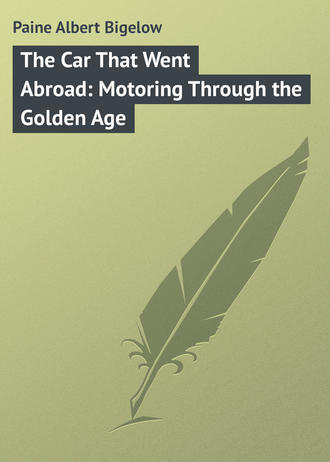
The Car That Went Abroad: Motoring Through the Golden Age
One afternoon, when they had been drifting several days, he sighted a little village not far ahead, on the west bank, an ancient "jumble of houses," with a castle, one of the many along that shore. It looked interesting and he suggested that they rest there for the night. Then, chancing to glance over his shoulder toward the eastward mountains, he received a sudden surprise – a "soul-stirring shock," as he termed it later. The big blue eastward mountain was no longer a mere mountain, but a gigantic portrait in stone of one of his heroes. Eagerly turning to Joseph Very and pointing to the huge effigy, he asked him to name it. The courier said, "Napoleon." The boatman also said, "Napoleon." It seemed to them, indeed, almost uncanny, this lifelike, reclining figure of the conqueror, resting after battle, or, as Mark Twain put it, "dreaming of universal empire." They discussed it in awed voices, as one of the natural wonders of the world, which perhaps they had been the first to discover. They landed at the village, Beauchastel, and next morning Mark Twain, up early, watched the sun rise from behind the great stone face of his discovery. He made a pencil sketch in his notebook, and recorded the fact that the figure was to be seen from Beauchastel. That morning, drifting farther down the Rhone, they watched it until the human outlines changed.
Mark Twain's Rhone trip was continued as far as Arles, where the current slackened. He said that some one would have to row if they went on, which would mean work, and that he was averse to work, even in another person. He gave the boat to its former owner, took Joseph, and rejoined the family in Switzerland.
Events thronged into Mark Twain's life: gay winters, summers of travel, heavy literary work, business cares and failures, a trip around the world, bereavement. Amid such a tumult the brief and quiet Rhone trip was seldom even remembered.
But ten or eleven years later, when he had returned to America and was surrounded by quieter things, he happened to remember the majestic figure of the first Napoleon discovered that September day while drifting down the Rhone. He recalled no more than that. His memory was always capricious – he had even forgotten that he made a sketch of the figure, with notes identifying the locality. He could picture clearly enough the incident, the phenomenon, the surroundings, but the name of the village had escaped him, and he located it too far down, between Arles and Avignon.
All his old enthusiasm returned now. He declared if the presence of this great natural wonder was made known to the world, tourists would flock to the spot, hotels would spring up there – all other natural curiosities would fall below it in rank. His listeners caught his enthusiasm. Theodore Stanton, the journalist, declared he would seek and find the "Lost Napoleon," as Mark Twain now called it, because he was unable to identify the exact spot. He assured Stanton that it would be perfectly easy to find, as he could take a steamer from Arles to Avignon, and by keeping watch he could not miss it. Stanton returned to Europe and began the search. I am not sure that he undertook the trip himself, but he made diligent inquiries of Rhone travelers and steamer captains, and a lengthy correspondence passed between him and Mark Twain on the subject.
No one had seen the "Lost Napoleon." Travelers passing between Avignon and Arles kept steady watch on the east range, but the apparition did not appear. Mark Twain eventually wrote an article, intending to publish it, in the hope that some one would report the mislaid emperor. However, he did not print the sketch, which was fortunate enough, for with its misleading directions it would have made him unpopular with disappointed travelers. The locality of his great discovery was still a mystery when Mark Twain died.
So it came about that our special reason for following the west bank of the Rhone – the Beauchastel side, in plain view of the eastward mountains – was to find the "Lost Napoleon." An easy matter, it seemed in prospect, for we had what the others had lacked – that is to say, exact information as to its locality – the notes, made twenty-two years before by Mark Twain himself8– the pencil sketch, and memoranda stating that the vision was to be seen opposite the village of Beauchastel.
But now there developed what seemed to be another mystery. Not only our maps and our red-book, but patient inquiry as well, failed to reveal any village or castle by the name of Beauchastel. It was a fine, romantic title, and we began to wonder if it might not be a combination of half-caught syllables, remembered at the moment of making the notes, and converted by Mark Twain's imagination into this happy sequence of sounds.
So we must hunt and keep the inquiries going. We had begun the hunt as soon as we left Avignon, and the inquiries when there was opportunity. Then presently the plot thickened. The line of those eastward mountains began to assume many curious shapes. Something in their formation was unlike other mountains, and soon it became not difficult to imagine a face almost anywhere. Then at one point appeared a real face, no question this time as to the features, only it was not enough like the face of the sketch to make identification sure. We discussed it anxiously and with some energy, and watched it a long time, thinking possibly it would gradually melt into the right shape, and that Beauchastel or some similarly sounding village would develop along the river bank.
But the likeness did not improve, and, while there were plenty of villages, there was none with a name the sound of which even suggested Beauchastel. Altogether we discovered as many as five faces that day, and became rather hysterical at last, and called them our collection of lost Napoleons, though among them was not one of which we could say with conviction, "Behold, the Lost Napoleon!" This brought us to Bagnols, and we had a fear now that we were past the viewpoint – that somehow our search, or our imagination, had been in vain.
But then came the great day. Up and up the Rhone, interested in so many things that at times we half forgot to watch the eastward hills, passing village after village, castle after castle, but never the "jumble of houses" and the castle that commanded the vision of the great chief lying asleep along the eastern horizon.
I have not mentioned, I think, that at the beginning of most French villages there is a signboard, the advertisement of a firm of auto-stockists, with the name of the place, and the polite request to "Ralentir" – that is, to "go slow." At the other end of the village is another such a sign, and on the reverse you read, as you pass out, "Merci" – which is to say, "Thanks," for going slowly; so whichever way you come you get information, advice, and politeness from these boards, a feature truly French.
Well, it was a little way above the château which I did not rent, and we were driving along slowly, thinking of nothing at all, entering an unimportant-looking place, when Narcissa, who always sees everything, suddenly uttered the magical word "Beauchastel!"
It was like an electric shock – the soul-stirring shock which Mark Twain had received at the instant of his great discovery. Beauchastel! Not a figment, then, but a reality – the veritable jumble of houses we had been seeking, and had well-nigh given up as a myth. Just there the houses interfered with our view, but a hundred yards farther along a vista opened to the horizon, and there at last, in all its mightiness and dignity and grandeur, lay the Lost Napoleon! It is not likely that any other natural figure in stone ever gave two such sudden and splendid thrills of triumph, first, to its discoverer, and, twenty-two years later, almost to the day, to those who had discovered it again. There was no question this time. The colossal sleeping figure in its supreme repose confuted every doubt, resting where it had rested for a million years, and would still rest for a million more.
At first we spoke our joy eagerly, then fell into silence, looking and looking, loath to go, for fear it would change. At every opening we halted to look again, and always with gratification, for it did not change, or so gradually that for miles it traveled with us, and still at evening, when we were nearing Valence, there remained a great stone face on the horizon.
Chapter XIII
THE HOUSE OF HEADS
I ought to say, I suppose, that we were no longer in Provence. Even at Avignon we were in Venaissin, according to present geography, and when we crossed the Rhone we passed into Languedoc. Now, at Valence, we were in Dauphiné, of which Valence is the "chief-lieu," meaning, I take it, the official headquarters. I do not think these are the old divisions at all, and in any case it all has been "the Midi," which to us is the Provence, the vineland, songland, and storyland of a nation where vine and song and story flourish everywhere so lavishly that strangers come, never to bring, but only to carry away.
At Valence, however, romance hesitates on the outskirts. The light of other days grows dim in its newer electric glow. Old castles surmount the hilltops, but one needs a field glass to see them. The city itself is modern and busy, prosperous in its manufacture of iron, silk, macaroni, and certain very good liquors.
I believe the chief attraction of Valence is the "House of the Heads." Our guidebook has a picture which shows Napoleon Bonaparte standing at the entrance, making his adieus to Montalivet, who, in a later day, was to become his minister. Napoleon had completed his military education in the artillery school of Valence, and at the moment was setting out to fulfill his dream of conquest. It is rather curious, when you think of it, that the great natural stone portrait already described should be such a little distance away.
To go back to the House of the Heads: Our book made only the briefest mention of its construction, and told nothing at all of its traditions. We stood in front of it, gazing in the dim evening light at the crumbling carved faces of its façade, peering through into its ancient court where there are now apartments to let, wondering as to its history. One goes raking about in the dusty places of his memory at such moments; returning suddenly from an excursion of that sort, I said I recalled the story of a house of carved heads – something I had heard, or read, long ago – and that this must be the identical house concerning which the story had been told.
It was like this: There was a wealthy old bachelor of ancient days who had spent his life in collecting rare treasures of art; pictures, tapestries, choice metal-work, arms – everything that was beautiful and rare; his home was a storehouse of priceless things. He lived among them, attended only by a single servant – the old woman who had been his nurse – a plain, masculine creature, large of frame, still strong and brawny, stout of heart and of steadfast loyalty. When the master was away gathering new treasures she slept in the room where the arms were kept, with a short, sharp, two-edged museum piece by her couch, and without fear.
One morning he told her of a journey he was about to take, and said: "I hesitate to leave you here alone. You are no longer young."
But she answered: "Only by the count of years, not by the measure of strength or vigilance. I am not afraid."
So he left her, to return on the third day. But on the evening of the second day, when the old servant went down to the lower basement for fuel – silently, in her softly slippered feet – she heard low voices at a small window that opened to the court. She crept over to it and found that a portion of the sash had been removed; listening, she learned that a group of men outside in the dusk were planning to enter and rob the house. They were to wait until she was asleep, then creep in through the window, make their way upstairs, kill her, and carry off the treasures.
It seemed a good plan, but as the old servant listened she formed a better one. She crept back upstairs, not to lock herself in and stand a siege, but to get her weapon, the short, heavy sword with its two razor edges. Then she came back and sat down to wait. While she was waiting she entertained herself by listening to their plans and taking a little quiet muscle exercise. By and by she heard them say that the old hag would surely be asleep by this time. The "old hag" smiled grimly and got ready.
A man put his head in. It was pitch dark inside, but just enough light came in from the stars for her to see where to strike. When half his body was through she made a clean slicing swing of the heavy sword and the robber's head dropped on a little feather bed which she had thoughtfully provided. The old woman seized the shoulders and firmly drew the rest of the man inside. Another head came in, slowly, the shoulders following. With another swing of the sword they had parted company, and the grim avenging hands were silently dragging in the remnant. Another head and shoulders followed, another, and another, until six heads and bodies were stacked about the executioner and there was blood enough to swim in. The seventh robber did not appear immediately; something about the silence within made him reluctant. He was suspicious, he did not know of what. He put his head to the opening and whispered, asking if everything was all right. The old woman was no longer calm. The violent exercise and intense interest in her occupation had unnerved her. She was afraid she could not control her voice to answer, and that he would get away. She made a supreme effort and whispered, "Yes, all right." So he put in his head – very slowly – hesitated, and started to withdraw. The old woman, however, did not hesitate. She seized him by the hair, brought the sword down with a fierce one-hand swing, and the treasures of this world troubled him no more.
Then the old servant went crazy. Returning next morning, her master found her covered with blood, brandishing her sword, and repeating over and over, "Seven heads, and all mine," and at sight of him lost consciousness. She recovered far enough to tell her story, then, presently, died. But in her honor the master rebuilt the front of his dwelling and had carved upon it the heads of the men she had so promptly and justly punished.
Now, I said, this must be the very house, and we regarded it with awe and tried to locate the little cellar window where the execution had taken place. It was well enough in the evening dimness, but in the morning when we went around there again I privately began to have doubts as to the legend's authenticity, at least so far as this particular house was concerned. The heads, by daylight, did not look like the heads of house breakers – not any house breakers of my acquaintance – and I later consulted a guidebook which attached to them the names of Homer, Hippocrates, Aristotle, Pythagoras, etc., and I don't think those were the names of the parties concerned in this particular affair. It's very hard to give up a good and otherwise perfectly fitting legend, but one must either do that or change the guidebook. Ah, well, it isn't the first sacrifice I've had to make for the sake of history.
Valence has been always a place of culture and educational activity. It was capital of Segalauni before the Romans came, and there was a celebrated school there, even then. This information also came from the guidebook, and it surprised me. It was the first time I had heard that the Segalaunians had a school prior to the Roman conquest. It was also the first time I had heard of the Segalaunians. I thought they were all Gauls and Goths and Vandals up that way, and that their education consisted in learning how to throw a spear convincingly, or to divert one with a rawhide buckler. Now I discovered they had a college before the Romans conquered them. One can hardly blame them for descending upon those Romans later, with fire and sword. Valence shared the usual fate. It was ravished by the so-called barbarians, and later hacked to pieces by Christian kings. To-day again it is a fair city, with parks, wide boulevards, and imposing monuments.
Chapter XIV
INTO THE HILLS
Turning eastward from Valence, we headed directly for the mountains and entered a land with all the wealth of increase we had found in Provence, and with even more of picturesqueness. The road was still perfect – hard and straight, with an upward incline, but with a grade so gradual and perfect as to be barely noticeable. Indeed, there were times when we seemed actually to be descending, even when the evidence of gravity told us that we were climbing; that is to say, we met water coming toward us – water flowing by the roadside – and more than once Narcissa and I agreed that the said water was running uphill, which was not likely – not in France. Of course, in England, where they turn to the left, it might be expected. The village did not seem quite like those along the Rhone. The streets were as narrow, the people as mildly interested in us, but, on the whole, we thought the general aspect was less ancient, possibly less clean.
But they were interesting. Once we saw a man beating a drum, stopping on every corner to collect a little crowd and read some sort of proclamation, and once by the roadside we met a little negro child in a straw hat and a bright dress, a very bit of the American South. Everywhere were pretty gardens, along the walls gay flowers, and always the valleys were rich in orchard and vineyard, plumed with tall poplars, divided by bright rivers, and glorified with hazy September sunlight.
We grew friendly with the mountains in the course of the afternoon, then intimate. They sprang up before us and behind us; just across the valleys they towered into the sky. Indeed, we suddenly had a most dramatic proof that we were climbing one. We had been shut in by wooded roads and sheltered farmsteads for an hour or two when we came out again into the open valley, with the river flowing through. But we were no longer in the valley! Surprise of surprises! we were on a narrow, lofty road hundreds of feet above it, skirting the mountainside! It seemed incredible that our gradual, almost imperceptible, ascent had brought us to that high perch, overlooking this marvelous Vale of Cashmere. Everyone has two countries, it is said; his own and France. One could understand that saying here, and why the French are not an emigrating race. We stopped to gaze our fill, and as we went along, the scenery attracted my attention so much that more than once I nearly drove off into it. We were so engrossed by the picture that we took the wrong road and went at least ten miles out of our way to get to Grenoble. But it did not matter; we saw startlingly steep mountainsides that otherwise we might not have seen, and dashing streams, and at the end we had a wild and glorious coast of five or six miles from our mountain fastness down into the valley of the Isère, a regular toboggan streak, both horns going, nerves taut, teeth set, probable disaster waiting at every turn. We had never done such a thing before, and promised ourselves not to do it again. One such thrill was worth while, perhaps, but the ordinary lifetime might not outlast another.
Down in that evening valley we were in a wonderland. Granite walls rose perpendicularly on our left; cottages nestled in gardens at our right – bloom, foliage, fragrance, the flowing Isère. Surely this was the happy valley, the land of peace and plenty, shut in by these lofty heights from all the troubling of the world. Even the towers and spires of a city that presently began to rise ahead of us did not disturb us. In the evening light they were not real, and when we had entered the gates of ancient Gratianopolis, and crossed the Isère by one of its several bridges, it seemed that this modern Grenoble was not quite a city of the eager world.
The hotel we selected from the red-book was on the outskirts, and we had to draw pretty heavily on our French to find it; but it was worth while, for it was set in a wide garden, and from every window commanded the Alps. We realized now that they were the Alps, the Alps of the Savoy, their high green slopes so near that we could hear the tinkle of the goat bells.
We did not take the long drive through the "impossibly beautiful" valleys of Grenoble which we had planned for next morning. When we arose the air was no longer full of stillness and sunlight. In fact, it was beginning to rain. So we stayed in, and by and by for luncheon had all the good French things, ending with fresh strawberries, great bowls of them – in September – and apparently no novelty in this happy valley of the Isère. All the afternoon, too, it rained, and some noisy French youngsters raced up and down the lower rooms and halls, producing a homelike atmosphere, while we gathered about the tables to study the French papers and magazines.
It was among the advertisements that I made some discoveries about French automobiles. They are more expensive than ours, in proportion to the horsepower, the latter being usually low. About twelve to fifteen horsepower seems to be the strength of the ordinary five-passenger machine. Our own thirty-horsepower engine, which we thought rather light at home, is a giant by comparison. Heavy engines are not needed in France. The smooth roads and perfectly graded hills require not half the power that we must expend on some of our rough, tough, rocky, and steep highways. Again, these lighter engines and cars take less gasoline, certainly, and that is a big item, where gasoline costs at least 100 per cent more than in America. I suppose the lightest weight car consistent with strength and comfort would be the thing to take to Europe. There would be a saving in the gasoline bill; and then the customs deposit, which is figured on the weight, would not be so likely to cripple the owner's bank account.
Chapter XV
UP THE ISÈRE
Sometime in the night the rain ceased, and by morning Nature had prepared a surprise for us. The air was crystal clear, and towering into the sky were peaks no longer blue or green or gray, but white with drifted snow! We were in warm, mellow September down in our valley, but just up there – such a little way it seemed – were the drifts of winter. With our glass we could bring them almost within snowballing distance. Feathery clouds drifted among the peaks, the sun shooting through. It was all new to us, and startling. These really were the Alps; there was no further question.
"Few French cities have a finer location than Grenoble," says the guidebook, and if I also have not conveyed this impression I have meant to do so. Not many cities in the world, I imagine, are more picturesquely located. It is also a large city, with a population of more than seventy-five thousand – a city of culture, and it has been important since the beginning of recorded history. Gratian was its patron Roman emperor, and the name Gratianopolis, assumed in his honor, has become the Grenoble of to-day. Gratian lived back in the fourth century and was a capable sort of an emperor, but he had one weak point. He liked to array himself in outlandish garb and show off. It is a weakness common to many persons, and seems harmless enough, but it was not a healthy thing for Gratian, who did it once too often. He came out one day habited like a Scythian warrior and capered up and down in front of his army. He expected admiration, and probably the title of Scythianus, or something. But the unexpected happened. The army jeered at his antics, and eventually assassinated him. Scythian costumes for emperors are still out of style.
We may pass over the riot and ruin of the Middle Ages. All these towns were alike in that respect. The story of one, with slight alterations, fits them all. Grenoble was the first town to open its gates to Napoleon, on his return from Elba, in 1815, which gives it a kind of distinction in more recent times. Another individual feature is its floods. The Isère occasionally fills its beautiful valley, and fifteen times during the past three centuries Grenoble has been almost swept away. There has been no flood for a long period now, and another is about due. Prudent citizens of Grenoble keep a boat tied in the back yard instead of a dog.
We did not linger in Grenoble. The tomb of Bayard —sans peur, sans reproche– is there, in the church of St. André; but we did not learn of this until later. The great sight at Grenoble is its environment – the superlative beauty of its approaches, and its setting – all of which we had seen in the glory of a September afternoon.









